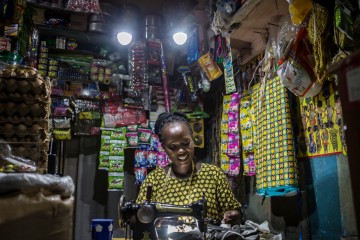- About
- Topics
- Picks
- Audio
- Story
- In-Depth
- Opinion
- News
- Donate
-
Signup for our newsletterOur Editors' Best Picks.Send
Read, Debate: Engage.
| February 06, 2020 | |
|---|---|
| topic: | Divestment |
| tags: | #waste-to-energy, #energy, #Ethiopia, #incineration |
| located: | Tanzania, Ghana, Nigeria, Ethiopia, South Africa |
| by: | Bob Koigi |
In Accra for example, up to 1,000 tonnes of waste is generated every day, with 65 percent of it being organic, coming from food waste and agricultural byproducts like corn husks. Tanzania’s capital Dar es Salaam produces over 4,600 tonnes of solid waste every day, while Nigeria, one of the largest producers of solid waste in Africa, generates 32 million tonnes every year.
Poor waste management practices have had adverse effects on the environment and the people allowing for breeding of mosquitoes and a proliferation of diseases, emission of greenhouse gases and clogging of drainage systems during rainy seasons.
On the other hand, energy poverty continues to be Africa’s Achilles heel with over 600 million people in Sub Saharan Africa lacking electricity. Countries in this region experience between 50 to 4,600 hours of power outages each year according to the World Bank, a situation that has made the cost of doing business in the region extremely high.
Unsustainable waste management and energy poverty in the continent have inspired new innovative models where countries are transforming organic waste into sustainable and clean energy.
In Ethiopia, the Koshe dump site in the outskirts of the capital Addis Ababa has been the only landfill for over 50 years. Growing to the size of 36 football pitches, the dumpsite has been an eyesore as waste piles up. In 2017 a landslide killed 114 people in the landfill. Now a new waste-to energy plant that started operations in 2018, and the first of its kind in Africa is taking the trash and transforming it into a source of power for the over 4 million residents of the capital. It incinerates 1,400 tonnes of waste every day, about 80 per cent of all city rubbish. The trash is burned in a combustion chamber with the resulting heat being used to boil water which turns to steam. This steam then powers a turbine generator which produces electricity. The facility dubbed Reppie is able to then produce 185 Gigawatts of electricity each year, enough to power 25 per cent of the capital’s households.
The University of Nigeria, Nsukka has also built an organic waste generating plant that is tackling power shortage and reducing spending on electricity bills, a first of its kind for any university in the West African nation.
In Cape Town, New Horizons Energy has been running a $30 million facility that seeks to transform some 560 tonnes of solid waste it receives daily into power. The organic waste is passed via pipes into vats that have bacteria that then converts it into natural gas. The end product is biogas that is cleaned and distributed to the market as methane rich or liquid carbon dioxide gas.
Kenya is also training its eyes on conversion of waste into clean energy. In Nairobi some 2.4 tonnes of waste is produced daily and dumped in Dandora landfill, one of the largest in the region that was declared full over 20 years ago but that still continues to receive mountains of trash. The government has announced plans to build a $197 million incineration plant this year with a 40 megawatts power capacity.
“African governments have realised the enormous energy demands especially from cities that are fast graduating into megacities. Unreliable power and poor infrastructure which are to blame for the power outages coupled with the dangers posed by the dumpsites have offered the governments a perfect chance to turn an eyesore into an opportunity for their people. The reason why the uptake is impressive across Africa is because of the governments have owned this projects and are actively chaperoning their implementation,” said Masinde Ikumu an Energy and Sustainability Solutions Specialist.
Incineration has offered plausible alternative in most of the African countries that have been struggling with shortage of land since it saves on the limited space while generating enough electricity within each landfill, prevents release of toxic chemicals into groundwater and release of greenhouses from the landfills to the atmosphere.
The concept of waste incineration to generate power has been a boom in Europe with up to a quarter of all municipal waste being incinerated. In France for example there are 126 waste to energy plants while in Germany there are 121.
As energy demands in Africa are poised to rise by 127 per cent by 2040 according to reports and the continent races to bridge the energy access gap, waste to energy technologies will feature in the mix of renewable power options the continent is looking to embrace.
By copying the embed code below, you agree to adhere to our republishing guidelines.

